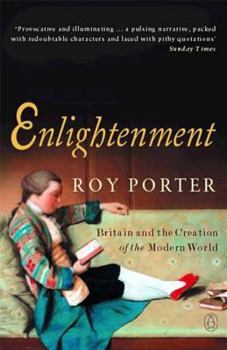Enlightenment: Britain and the Creation of the Modern World
(Part of the Studies in European History Series)
Select Format
Select Condition 
Book Overview
It is almost impossible to encapsulate briefly the range and variety contained in Roy Porter's major new book. This description may be from another edition of this product.
Format:Paperback
Language:English
ISBN:014025028X
ISBN13:9780140250282
Release Date:December 2001
Publisher:Penguin UK
Length:672 Pages
Weight:1.15 lbs.
Dimensions:1.5" x 5.1" x 7.8"
Customer Reviews
4 ratings
concise summary of the academic literature
Published by Thriftbooks.com User , 14 years ago
this succinct text is basically a very high quality, informed and judicious "cliff's notes" overview of the sprawling academic literature on the enlightenment -- summarized at the end as an annotated, 13 page bibliography and a detailed, 7 page index. with repeated hat tips to peter gay's landmark, two volume study (1960), porter reviews subsequent confirmations and dissents from gay's narrative and major conclusions about the enlightenment in an "on the one hand ... on the other hand" style. the compact, briskly written chapters cover definitions of the enlightenment, the enlightenment project of creating a secular "science of man," the politics and religious attitudes of the philosophes, and the unity or diversity among the various enlightenment participants, both as individuals and as national, social and class movements. Porter's verdict: "The Enlightenment helped to free man from his past. In so doing, it failed to prevent the construction of future captivities" (tyrannies such as the french revolution and napoleonic era, exploitation of labor by capital, technological alienation, etc.).
The Enlightenment:the power of ideas
Published by Thriftbooks.com User , 20 years ago
I have just finished reading this book for the 3rd time. Need I say any more about the fascinating nature of both the writing style and content of this work?It is refreshing to consider how 'ideas' have changed and molded a nation. So many 'histories' focus on the power of armies to change the course of civilizations and the way we live.Porter, however, presents in a very positive and lively fashion the power of ideas - of philosophy, science, literature, reading and religion - to humanize and civilize a society.I particularly enjoyed his treatment of the writings of David Hume and Adam Smith, and congratulate Porter for presenting their views on human nature is such a simple, understandable, relevant and cleverly contextual manner.Very highly recommended!
Impressive, but...
Published by Thriftbooks.com User , 20 years ago
It appears that Roy Porter has a full-length book on British Enlightenment published by Penguin, and my review refers to that book and not this one, although both have the same title.
Impressive
Published by Thriftbooks.com User , 20 years ago
130 pages of endnotes in fine print for under 500 pages of text, plus another 77 pages (again in fine print) of bibliography, and then a full index - this book is a scholar's dream. Yet its easy style is aimed at a wide readership too.Who can doubt the seminal role of Britain in the Enlightenment? The French may have started it. But Britain carried the movement forward. I'm impressed by the evidence.Porter gives prominent place to the roles of Hume, Locke, and especially Priestley, with justice. Also mentioned are Gibbon, Swift, Malthus, and Samuel Johnson, and of course Adam Smith. Ben Franklin was a giant of the Enlightenment, but not of BRITISH Enlightenment, although he spent many adult years living in London, and knew many of these men. (Indeed Franklin brought Priestley over to America.) So Franklin is not covered in depth here. He was American.This is the kind of book I'd love to read on the couch in many a long Canadian winter night. I also recommend Jenny Uglow's "The Lunar Men," which covers similar but not the same ground (and has much to say about Priestley too, who was also a "Lunar Man")





